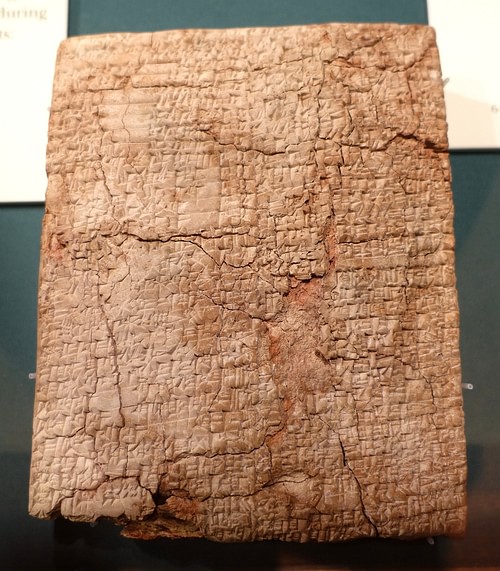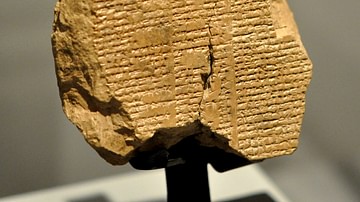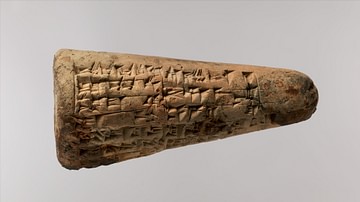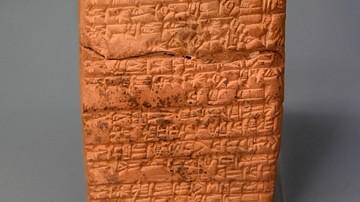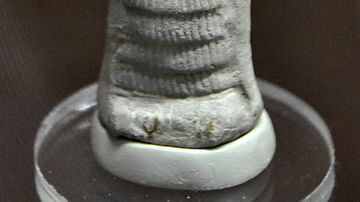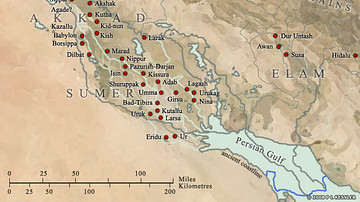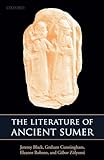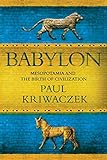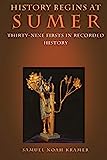A Praise Poem of Shulgi (c. 2020-2000 BCE) is an ancient Sumerian document celebrating the famous run of 200 miles (321.8 km) in one day made by the king Shulgi of Ur (r. 2029-1982 BCE) to distinguish his reign by officiating at the religious festivals in the cities of Nippur and Ur on the same day.
The piece was either commissioned or written by Shulgi who is depicted throughout as "a mighty man," swift as an owl or falcon, determined as a mule, fierce as a lion, husband of the goddess Inanna, who has done what no king before him had ever even attempted. He makes clear his run was made "so that my name should be established for distant days and never fall into oblivion" (line 36) and he accomplished this not only by the act itself but also through a public relations campaign announcing it of which A Praise Poem of Shulgi was a central aspect.
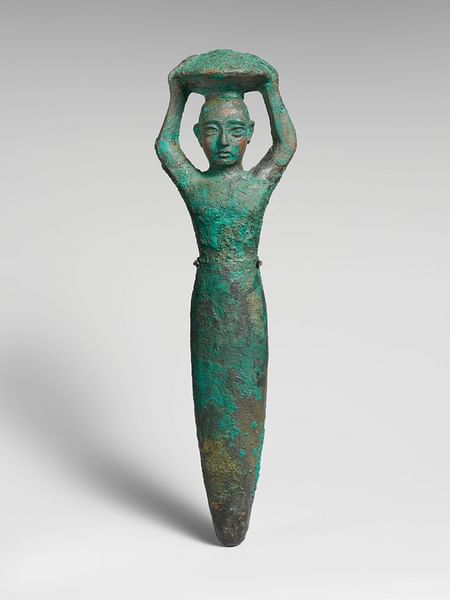
Messengers were sent throughout Shulgi's kingdom proclaiming news of his run and reading A Praise Poem of Shulgi and other poems associating the king with the gods and impressing upon his subjects the claim Shulgi had made for himself: that he, like the great Akkadian monarch Naram-Sin (r. 2261-2224 BCE) before him, was a god. Shulgi's campaign of propaganda is considered a success as there are no accounts relating rebellions or social unrest throughout his reign.
According to some scholars, however, this might be due to Shulgi falsifying the records to make himself appear a much greater, stronger, and wiser king than he actually was, though this claim has been challenged. A Praise Poem of Shulgi became a popular piece and was included in the curriculum of the scribal school (the edubba) as one of the works comprising the Decad, a group of ten compositions a student needed to master toward the end of their education in order to graduate.
The piece is known today by its catalog title as Shulgi A but is also referenced by the other translations of the king's name (Sulgi, Culgi, or Dungi), as Hymn of Sulgi, Hymn of Culgi, or Hymn of Dungi, though these are used less frequently than they were in the 20th century. A Praise Poem of Shulgi is frequently anthologized in the present day just as it was in scribal schools over 2000 years ago and, among aficionados of Mesopotamian literature, remains just as popular.
The King & His Run
Shulgi of Ur was the son of Ur-Nammu (r. 2047-2030 BCE), founder of the Third Dynasty of Ur in Sumer, and a daughter of the warrior-king Utu-Hegel who initiated the revolt against the Gutians (regarded as oppressive conquerors) which was continued by Ur-Nammu who was killed in battle. When Shulgi came to the throne, his first task was to avenge his father, but, even after driving the Gutians from Sumer, he still seems to have felt the need to distinguish himself from the celebrated accomplishments of Utu-Hegel and Ur-Nammu.
He initially concerned himself with improving the lives of his subjects through upgrades to the infrastructure. He built new roads, improved old ones, encouraged trade, boosted the economy, established roadside inns for travelers, and either continued or instituted the law code of his father, the Code of Ur-Nammu, to establish justice and maintain peace. He also encouraged development in musical performance, as he was a musician who claimed to be accomplished on a number of instruments, and reformed the scribal schools of Sumer to increase literacy.
Further, he established a standing army of professionally trained soldiers and led them on a series of military victories from Ur (also known as Urim) to the north until he had conquered a territory corresponding to the regions of modern-day Kuwait up through Iraq. He standardized weights and measures, the calendar, and time so that his entire kingdom operated according to the same understanding, and he also initiated agricultural reforms.
None of this, however, seems to have been enough for him to feel as though he stood apart from the reigns of earlier kings and so, as an athlete, he chose to make his famous run. He ran from Nippur to Ur (a distance of 100 miles/160.9 km) and officiated at Ur's religious festival and then ran back from Ur to Nippur on the same day, through a sudden storm, to preside over the festival there. He covered 200 miles (321.8 km) in a single day, a feat no other king could claim, and this was finally enough to assure Shulgi that his name would be honored by future generations.

Summary & References
The speaker of the poem is Shulgi who begins by identifying himself by name and title as "king of the four regions" of Sumer and then links himself with the great hero Gilgamesh in line 7 when he says, "I am a child born of Ninsun" who was Gilgamesh's mother, before then identifying himself with Anu (An) the sky god, Enlil and his consort Ninlil, the divine couple, Nintud (another name for Ninhursag, the Mother Goddess), Enki (god of wisdom), and Nanna, the moon god. In line 18, he calls himself a "stallion of Sakkan", a reference to the swift god of herds and wild animals (also known as Cakkan), and then makes clear he is literate and wise as a "knowledgeable scribe of Nisaba," a reference to the goddess of writing.
In lines 26-35, he touches upon the new roads he has built between Ur and Nibru (Nippur), and in line 36, he gives the reason for his run: "So that my name should be established for distant days and never fall into oblivion" before describing his run, his observances at the festival, and his personal strengths throughout the rest of the piece, including his establishment of inns and his adoration by the "black-headed people," the Sumerians, while identifying himself with the swiftest and strongest animals. Scholar Jeremy Black comments:
Animal and bird imagery permeates this hymn. Shulgi mostly likens himself to a lion…but creatures which are renowned for their endurance or speed are also summoned up. Equids are the subject of the third paragraph, while the ass image is also used later in the composition…Shulgi is also "like a mountain kid hurrying to its habitation" or like the mythical Anzud bird "lifting its gaze to the mountains." (304-305)
He claims to have entered the E-kis-nugal – where fates are determined – and been welcomed by Utu (another name for Shamash, the sun god and god of justice) and identifies himself as the husband/consort of Inanna (later known as Ishtar), goddess of love, procreation, fertility, and war. He later references Nunamir (another name for Enlil), Suen (another name for Nanna), and Lugalbanda, the great mythical king, fully establishing himself as one loved by the gods and welcomed by them as an equal. The poem ends with the traditional praise to Nisaba which concluded most compositions, thanking the goddess of writing for her inspiration and guidance.
The Text
The following passage is taken from The Literature of Ancient Sumer, translated by Jeremy Black et al. Ellipses indicate missing words or lines in the text and question marks a different interpretation of a word.
1-6: I, the king, was a hero already in the womb; I, Sulgi, was born to be a mighty man. I am a fierce-looking lion, begotten by a dragon. I am the king of the four regions; I am the herdsman and shepherd of the black-headed people. I am a respected one, the god of all the lands.
7-15: I am a child born of Ninsun. I am the choice of holy An's heart. I am the man whose fate was decided by Enlil. I am Sulgi, the beloved of Ninlil. I am he who is cherished by Nintud. I am he who was endowed with wisdom by Enki. I am the powerful king of Nanna. I am the growling lion of Utu. I am Sulgi, who has been chosen by Inana for his attractiveness.
16-18: I am a mule, most suitable for the road. I am a horse, whose tail waves on the highway. I am a stallion of Sakkan, eager to run.
19-25: I am a knowledgeable scribe of Nisaba; I have perfected my wisdom just as my heroism and my strength. Reliable words can reach (?) me. I cherish righteousness but do not tolerate wickedness. I hate anyone who speaks wickedly.
26-35: Because I am a powerful man who enjoys using his thighs, I, Sulgi, the mighty king, superior to all, strengthened (?) the roads, put in order the highways of the Land. I marked out the danna [double-hour] distances, built lodging houses there. I planted gardens by their side and established resting places and installed in those places experienced men. Whichever direction one comes from, one can refresh oneself at their cool sides; and the traveller who reaches nightfall on the road can seek haven there as in a well-built city.
36-41: So that my name should be established for distant days and never fall into oblivion, so that my praise should be uttered throughout the Land, and my glory should be proclaimed in the foreign lands, I, the fast runner, summoned my strength and, to prove my speed, my heart prompted me to make a return journey from Nibru to brick-built Urim as if it were only the distance of a danna [double-hour].
42-47: I, the lion, never failing in his vigour, standing firm in his strength, fastened the small nijlam garment firmly to my hips. Like a pigeon anxiously fleeing from a ... snake, I spread my wings; like the Anzud bird lifting its gaze to the mountains, I stretched forward my legs. The inhabitants of the cities which I had founded in the land, lined up for me; the black-headed people, as numerous as ewes, looked at me with sweet admiration.
48-59: I entered the E-kis-nugal like a mountain kid hurrying to its habitation, when Utu spreads broad daylight over the countryside. I filled with abundance the temple of Suen, a cow-pen which yields plenty of fat. I had oxen slaughtered there; I had sheep offered there lavishly. I caused sem and ala drums to resound there and caused tigi drums to play there sweetly. I, Sulgi, who makes everything abundant, presented food-offerings there and, like a lion, spreading fearsomeness from (?) the royal offering-place, I bent down (?) and bathed in flowing water; I knelt down and feasted in the Egal-mah of Ninegala.
60-69: Then I arose like an owl (?), like a falcon to return to Nibru in my vigour. But a storm shrieked, and the west wind whirled around. The north wind and the south wind howled at each other. Lightning together with the seven winds vied with each other in the heavens. Thundering storms made the earth quake, and Iskur roared in the broad heavens. The rains of heaven mingled with the waters of the earth. Small and large hailstones drummed on my back.
70-78: I, the king, however, did not fear, nor was I terrified. I rushed forth like a fierce lion. I galloped like an ass in the desert. With my heart full of joy, I ran (?) onward. Trotting like a solitary wild ass, I traversed a distance of fifteen danna [double-hours] by the time Utu was to set his face toward his house; my sagursag priests looked at me with admiration. I celebrated the eses festival in both Nibru and Urim on the same day!
79-83: I drank beer in the palace founded by An with my brother and companion, the hero Utu. My singers praised me with songs accompanied by seven tigi drums. My spouse, the maiden Inana, the lady, the joy of heaven and earth, sat with me at the banquet.
84-87: Truly I am not boasting! Wherever I look to, there I go; wherever my heart desires, I reach. (1 ms. adds at least 10 lines) An placed a legitimate and lofty crown firmly on my head.
88-94: In the lustrous E-kur, I seized the holy sceptre and I lifted my head towards heaven on a shining dais, a throne with firm foundation. I consolidated my kingship, subdued the foreign lands, fortified the Land. May my name be proclaimed among the well-guarded people of the four regions! May they praise it in holy hymns about me! May they glorify my majesty, saying:
95-101: "The one provided with lofty royal power; the one given heroism, power and happy life by Suen of the E-kis-nugal; the one endowed with superior strength by Nunamnir; Sulgi, the destroyer of foreign lands, the fortifier of the Land, the purification priest of heaven and earth, who has no rival; Sulgi, who is cared for by the respected child of An!"
102: Praise be to Nisaba!
Conclusion
The question debated by scholars in the modern era, especially in the light of the charge that Shulgi may have falsified records of his reign, is "Did Shulgi really make his famous run?" Most scholars believe he did, as scholar Paul Kriwaczek explains:
Could he really have done it? An earlier generation of Assyriologists thought the achievement impossible, dismissing it as fiction. More recent consideration, however, suggests otherwise. An article in the Journal of Sport History quotes two relevant records: "During the first forty-eight hours of the 1985 Sydney to Melbourne footrace, Greek ultra-marthoner Yannis Kouros completed 287 miles. This impressive distance was accomplished without pausing for sleep." In the 1970s a British athlete running on a track completed 100 miles in a time of eleven hours and thirty-one minutes. There is no reason to believe that the Sumerians were any less athletically able. Theirs was, after all, a far more physical world than is ours: speed, strength, and stamina would have been much more important to them that they are to us. (157)
Even if Shulgi did not make the run as he claimed, that would have made no difference to the people of ancient Sumer who regularly kept dates according to momentous events. Shulgi's public relations campaign met its goal completely since, after his famous run, years were dated from, "The Year When the King Made the Round Trip Between Ur and Nippur in One Day" and the event was accepted as factual. The story was further impressed upon the cultural history of Sumer by the inclusion of A Praise Poem of Shulgi in the curriculum of the scribal schools, ensuring that the great king's hope that his name "should be established for distant days" would be realized.

